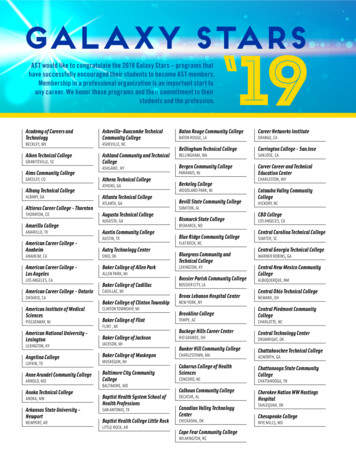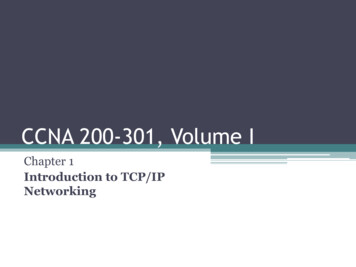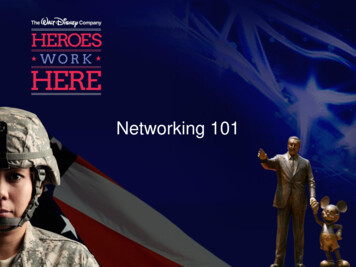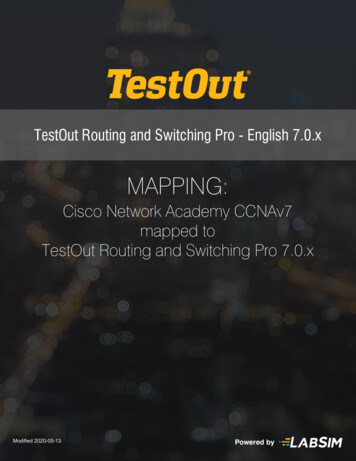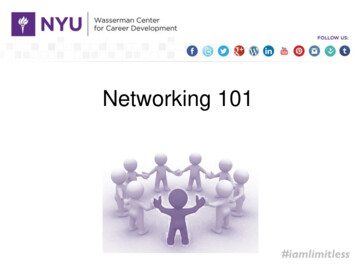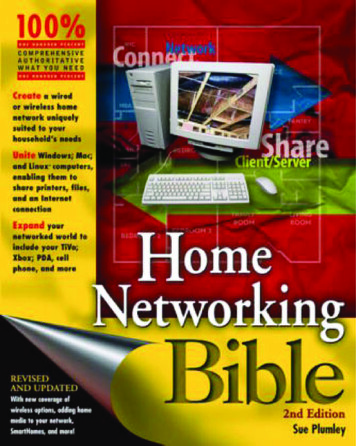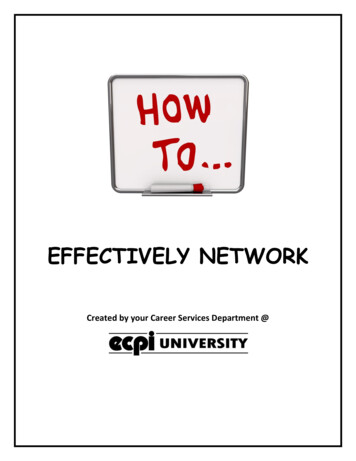
Transcription
EFFECTIVELY NETWORKCreated by your Career Services Department @
TABLE OF CONTENTSNetworking OverviewThe Dos and Don’ts of NetworkingNetworking Checklist:Video Tutorials:
WHAT IS NETWORKING?“The exchange of information or services among individuals, groups, or institutions; specifically, the cultivation ofproductive relationships for employment or business.” – Merriam-Webster Dictionary Definition. 75%-90% of jobs are apart of the hidden job market accessible only by networking.DIFFERENT TYPES OF NETWORKS:The Social Network: Your own personal network of contacts made informally through social or non-business activities.These contacts may comprise of family, friends, friends of friends or community members at your church or in varioussocial clubs, etc.The Professional Network: Any contact leveraged for employment or business reasons. Contacts made through businessactivities including former work colleagues and industry professionals met at networking events, professionalassociations, or skills-based volunteering. This also includes instructors, fellow students/alumni, as well as, youaccountants, lawyers, doctors, real estate agents, and so on.Both networks play an integral role in your job search and career advancement.HOW TO FIND NETWORKING OPPORTUNITIES:Networking can occur at various levels and in a variety of settings. Just because an event doesn’t use the word“networking” in the title doesn’t mean the event won’t provide an opportunity to interact and create relationships,whether they are personal or professional. Every event you attend is a networking opportunity—you never know whoyou might meet and where they work or who they know!1.) Community Service/Volunteer Work – Being involved in your community can really help you become morevisible. Although giving back may not lead to a direct opportunity, the exposure almost always leads to indirectconnections in some way. By volunteering at various places related to your major, you are showing employersyou are truly dedicated to serving others. This skills-based volunteering helps build your résumé and allows youto build connections with people working in your desired industry. Example: A great way to gain experience in your field and network in your community is to becomemore involved in organizations/agencies that align with your career goals. For Criminal Justice students,this might mean volunteering at the Department of Corrections doing basic clerical tasks. For nursingstudents, this could mean volunteering at nursing homes, the American Red Cross, or your local bloodbank. Tip: Nonprofit organizations are a great place to start looking for skills-based volunteeropportunities.2.) Professional Associations – This type of networking is good for creating strategic alliances with professionals inyour industry. Moreover, belonging to professional associations, specifically targeted to people in your field ofstudy, is a great way to network and tap into the hidden job market. Example: Business students interested in having a career in Human Resources may be interested inbelonging to SHRM (Society for Human Resource Management). Similarly, Medical Assisting studentsmay benefit from joining the AAMA (American Association of Medical Assistants).3.) Social Organizations – This type of networking can occur in a more laidback setting and with people you sharepersonal and non-professional interests. Example: Participating in sports leagues and interest clubs are a great way to network. This might notnecessarily be comprised of people with the same professional affiliations as you, but it is a wonderfulway to network amongst people with whom you are socially interacting. You may strike up aconversation with an acquaintance who knows someone at a company where you would like to work.
4.) Career Fairs – Career fairs are one of the easiest and greatest opportunities for networking. Companies thatattend career fairs are looking to build a talent pipeline, and usually, have open positions. The career fair settingis designed for attendees to approach employers and requires active participation. Tip: Understand why you are there (student looking to start a professional network, looking for aninternship, or graduate looking for full-time/part-time, entry-level position). If possible, create a targetlist of employers prior to the event, and do research so that you can engage in meaningful conversation.USE THESE APPS TO HELP YOU STAY IN TOUCH:Bond: Remembering to keep in touch with people can be tricky, but Bond helps you search through your contacts to see who youhaven’t talked to in a while.LunchMeet: It’s always awkward to ask interesting people to coffee, only to find out that they’re not in your area. LunchMeet fixesthat!Happening: Is building your network a big goal for 2015? (Hint: It should be.) Luckily, Happening helps you find networking events inyour area.Hashable: Who needs paper business cards when you can have digital ones that won’t end up at the bottom of someone’s purse?Networkr: Meet Networkr: It’s Tinder for LinkedIn. Swipe through different professionals in your area (based on common interestsand industries). If you and another careerist tell the app that you’d like to meet, you’ll have the opportunity to chat with oneanother privately.Contacts Journal: Sure, you vaguely remember meeting someone at a networking event, but you can’t remember the context ordetails of your conversation. Contacts Journal acts as a relationship management system to keep track of everyone you meet.Insightly: Insightly is a free CRM system that helps you manage your key contacts and relationships. Definitely a must-have for thejob search!Contactually: One of the hardest parts of the networking process is remembering to check in with your contacts on a regular basis.Luckily, Contactually sends you reminders (so you don’t have to keep track of everything on your own).
DON’T KNOW HOW TO NETWORK?Networking is a major part of any career whether you’re seeking advancement opportunities or building a client base.You need to meet new people, expand your contacts, and be actively prepared to go and chase businesses. See belowfor some dos and don’ts:DO:1. Research – Network with intent. Find out who is going to be at an event and ensure they are the kind of people thatcould be prospective contacts for you.2. Remember to smile – Often, people at networking events forget to smile (they are generally the people who don’tlike networking). Remember to smile often and smile sincerely.3. Read today’s newspaper – Read the local newspaper before an event to find five or six current event topics you canbring into a conversation. Engaging in conversation and asking people their opinion is a great way to get theconversation flowing. Avoid topics that are controversial or will result in political debates.4. Ask open-ended questions – Ask better questions and get better answers—avoid questions that can be answeredwith a simple “yes” or “no.”5. Take plenty of business cards – Take plenty and dish them out. You can even have two versions—one with yourmobile number on it, and one without, if you don’t necessarily want everyone to have your direct number. Not working?Create your own personalized business cards outlining your value proposition.6. Have a defined elevator pitch – An integral part of your personal brand toolkit, a good elevator pitch should quicklyand briefly define who you are and how you can help the listener. Also called a personal value proposition, should bememorable and end with a call to action like giving your business card and encouraging the listener to contact you.7. Always have a pen – Write down notes on the back of business cards after you meet a person. Don’t do it in front ofthe person—that is inappropriate—but afterward: what action you should take, what potential there is to do businesswith the contact, etc.8. Hang out near the food – People are always much more relaxed near the food, sharing guilty treats and laughingwhile they do it. This is the perfect place to meet people (and carrying extra napkins can make you very popular).9. Look for groups of people rather than individuals – It can be easier to approach a group that is in a discussion than itcan be to approach an individual directly. Approach a group, and someone will hold out a hand to introducehimself/herself. Then, you can join their conversation instead of having to start a new one.10. Enlist the aid of others to introduce you – If you want to meet someone in particular, find a friend who knows theperson, and ask your friend to provide a personal introduction between the two of you.11. Offer a compliment and be sincere when you do it – We all like someone to say something nice to us, but make itgenuine. It might be something someone is wearing, something you may have heard about the person, his/her business,or even industry.12. Focus on the person in front of you – A common pet peeve is when the person you are talking to keeps looking ateveryone else, or his phone, totally distracted from what you are saying. Don’t be that person. If the person in front ofyou is not your target market, politely excuse yourself.13. Go with a specific outcome in mind – Set a specific objective for the networking event. For example, “I’m going tomeet five prospective new employers/clients tonight.”
14. Use the other person’s name in conversation to help you remember him/her – When you first meet someone, usehis/her name right away, and keep using it in the conversation.15. Be enthusiastic about your business when asked – When people ask you what you do, be excited and passionateabout it. If you aren’t, don’t expect anyone else to be.16. Follow-up quickly to get the best results – The best networkers are the people who actually work at networking.They meet people, they take notes, they follow up the next day, they build relationships—they get the business. Haveyou connected to your contacts on LinkedIn yet?DON’T:1. Ask "do you remember me" – This question is awkward, forces someone to lie if they do not, and does not add to theconversation. Instead, greet the person and introduce yourself. Alternately, if unsure about having met someonepreviously, always say “It’s good to see you, XX” after the individual introduces themselves.2. Ask "is this your first convention" – Questions need to be open-ended and not require a one-word answer. Instead,say, “What brought you to this convention, and what have you enjoyed the most so far?”3. Not connect on LinkedIn after - Personalize your connection request using the notes you put on the back of the newcontact’s business card.4. Not follow up after meeting someone – Writing a hand-written follow-up note stands out, especially if they requestthat you follow up with them.5. Not make a connection – It’s not enough to just attend a networking event, you need to actually network and makeyour presence known.6. Judge a book by its cover – Keep an open mind when it comes to meeting people. Don’t fall into the habit ofassuming anything about anyone simply on the basis of his/her looks or job title.7. Just hang out with people you know – This is the single biggest mistake. We find someone we know, and we staywith that person for the entire event. Instead, move around the room, introduce yourself, and meet new people. Sure,it is a little challenging, but the more you do it the easier it becomes.Bonus: Click HERE to view a helpful video on conversation killers
NETWORKING CHECKLIST:The Basics: Before you can become a better networker, you have to master these essentials:o Always introduce yourselfo Shake handso Bring lots of business cardso Outline your goalso Be genuineo Stay positiveo Keep a generous mindsetYour Body Language: When you’re meeting with others, it’s important that you convey yourself in a friendly yetprofessional manner. Make sure you’re communicating the right message with these body language tips:o Maintain good eye contacto Smileo Learn forwardo Stand confidentlyo Walk like you know where you’re goingLooking Inward: Much of networking takes place with people you don’t know too well. Use these tips to help build yournetwork through those that are already close by:o Go to company eventso Seek out a mentoro Start a happy hour groupChoosing Groups and Contacts: You can’t and shouldn’t attempt to join every group possible to talk to every person youcan. Rather, focus on the ones that matter most by using these tips:o Define what you’re looking foro Visit a variety of groupso Be strategico Join a news groupo Target your marketConversational Skills: Keep others engaged and interested by developing your conversational skills with these tips:o Ask open-ended questionso Have a concise description of yourselfo Ask lots of questionso Be clearo Start smallShaking Nerves: Networking is a little daunting for introverts, but these tips are designed to make you feel a bit morerelaxed at networking events:o Be a volunteero Dress comfortablyo Attend when your energy is highesto Show up earlyo Remind yourself of your worth
oGo to events with a purposeGetting Connected: Use these methods to find new people with whom to network:o Stand close to the entranceo Pick a nametago Seek out lonerso Hang out near the grubo Don’t sell at meetingso Differentiate yourselfBusiness Cards: These are just a few ways you can use business cards more effectively when networking:o Make noteso Never deal out cards impersonallyo Get creativeo Carry them everywhereRelationship Building: Once you’ve made initial contact, use these tips to forge strong relationships with your newnetworking partners:o Always follow-upo Find common groundo Offer somethingo Share your contactso Focus on quality over quantityo Offer introductionsFollowing -Up: Keep things going with these follow-up tips:o Say something interestingo Make future planso Follow up quickly
Importance of NetworkingBuild Your NetworkThe Elevator PitchCareer Fair Success“Networking is not just about connecting people. It’s about connecting people with people, people withideas, and people with opportunities.”
2.) Professional Associations - This type of networking is good for creating strategic alliances with professionals in your industry. Moreover, belonging to professional associations, specifically targeted to people in your field of study, is a great way to network and tap into the hidden job market.




